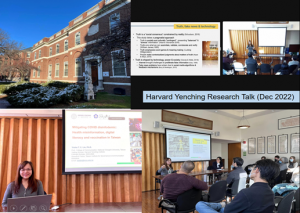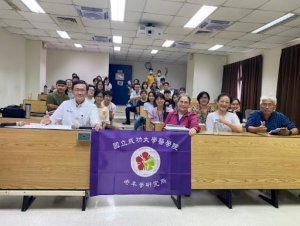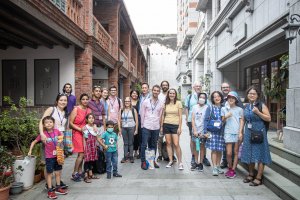I am honored to have been included in the first Fulbright International Education Administrators Seminar in Taiwan. I applied to this experience to enrich myself and to hopefully bring back ideas on how my university can send more students to Taiwan. This seminar marks my first experience in an Asian country, and it was an opportunity of a lifetime to see life in Taiwan and to hear from locals about their home country and culture.
I greatly enjoyed seeing how welcoming and open-minded the people I encountered were. Especially when I do not know the language, I try to avoid being the stereotypical traveler who thinks that everyone knows my language. So, I enjoyed the pantomiming and my (sometimes failed) attempts at interacting with people in markets, restaurants, and on the street. I only had one time that I truly felt frustrated – and that was when I had already eaten a meal at the night market, and I was wanting to pay. It shows how trusting Taiwanese people are when even with expressions and trying to hand over money, they thought I was wanting to order food, not pay for what I had already received. Then there was the time when a member of our group dropped a coin and someone chased us down to give it back. These are not acts of kindness or generosity that I see all of the time, and it shows me that Taiwan is a safe place for all.
From our university visits, I learned more about Taiwanese higher education and how much of the country is well-educated. I think it is becoming more of the norm in the U.S. as well, but in Taiwan, especially with the academics we encountered, it seemed that higher education is the standard, and to be competitive one would need a graduate degree to compete in the professional marketplace. Not only that, but many students are also going abroad for full degrees from foreign institutions. Part of this is a limited number of graduate programs, but also because professionals understand the importance of an international education as one that will help them in a country where nearly everything is imported. Being able to effectively communicate across cultures is a skill that they learn by studying overseas, and it is a skill that is valued in Taiwan.
The visits with English Teaching Assistants (ETAs) and the stops at their schools were also greatly beneficial. I participated in two different Teaching English As A Foreign Language (TEFL) programs after graduating with my Bachelors, and while I enjoyed having that experience to live overseas, I did not feel like I had support. By seeing these ETAs in Taiwan, meeting their coordinators, co-instructors, and students, I could immediately tell that they were well taken care of. Fulbright has a support system for these recent college graduates, and that support system takes an interest in their well-being. Dr. Vocke mentioned how ETAs have to be comfortable at home in order to be effective in the classroom, and I agree wholeheartedly. It was wonderful to see that this is how Fulbright Taiwan works with their ETAs.
By working with faculty-led study abroad programs, I went into each meeting of the seminar wanting to hear what each university emphasized as a strength. Nearly every university we visited gave me ideas on what areas I could try to bring together from my school to try to partner with colleagues in Taiwan. I see many parallels not only in the curriculum being offered at the different universities, but also in the student populations the universities serve. East Carolina University is looking to focus on partnerships with universities where the country is an emerging market economy, where the students are coming from rural populations, and where there are coastal communities. These three are all a part of Taiwanese universities, and I hope that by finding those parallels I can also find a way for my university to collaborate with one of the universities we visited.
One of the challenging aspects that I have been contemplating since my return is that I now have a greater understanding of the needs of Taiwan, and I will need to find the right fit for my university to branch out there. While at National Taiwan University, I learned that the representatives from the English department have a colleague who works at East Carolina University. I plan to reach out to this person and discuss ways that we might be able to collaborate on setting up a faculty-led program focusing on Asian literature since that is her area of expertise. I would also like to explore opportunities for our faculty in coastal and marine science to coordinate with the researchers at several of the different universities we visited, and even at the National Aquarium.
I would also like to become more involved with the Fulbright program on campus. Over the past 10 years, only a handful of students from East Carolina University have gone through the ETA program, and many faculties are not aware of the process to apply for scholar opportunities. To try to boost the number of Fulbright grantees at or from East Carolina University, I am scheduling a meeting with our campus’s Fulbright advisor to see if there are any ways I can become more involved in recruitment or advising.
In the coming weeks, I will be meeting with my university’s Executive Director of Global Affairs to discuss ways that we might be able to branch out to Taiwan. I am optimistic about this meeting, and I hope that there will be opportunities for future collaboration with Taiwanese institutions from this seminar. I plan to talk about the potential research collaborations, faculty-led opportunities, and possibilities for our students to direct-enroll.
This was an experience that will stay with me for the rest of my life. It was a unique opportunity to see a new place and learn first-hand about the education system of Taiwan. The Fulbright staff were some of the most welcoming people I have ever traveled with, and I want to thank all of you for everything you did to make this program a success.
Managing Editor: Chih-Hsuan Tsao 曹芷瑄







